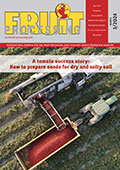Further award for Nature MultiPack™: at this year’s FachPack trade show in Nuremberg, Germany, the KHS Group was presented with the Green Star Packaging Award for its innovative packaging system. Nature MultiPack™, which holds cans together with dots of adhesive, won in the Product category. The Green Star Packaging Award honors environmentally-friendly packaging and recycling and improvements in operational packaging-related processes. Winners of the prize are entitled to participate in the WorldStar Award.
Sustainability and innovation as goals
The pioneering style of packaging combines innovation and sustainability. The Nature MultiPack™ marketed by NMP Systems, a wholly-owned subsidiary of KHS GmbH, groups beverage containers into a stable, easily ‘openable’ or separable pack using dots of adhesive rather than shrink film. In addition to the recent award-winning version for cans, which can be formed into multipacks of 1 x 3, 1 x 4, 2 x 2, 2 x 3 and 2 x 4, PET bottles can also be grouped in this way into packs of 2 x 2 and 2 x 3. A convenient carrying handle, which helps to keep the pack stable, and the individual alignment of the respective containers communicate effective marketing messages. The new packaging has also been designed to withstand transportation and marketing logistics while allowing the consumer to easily remove the individual containers from the multipack.
Materials and energy saved by the Nature MultiPack™
Compared to containers classically packed in film the Nature MultiPack™ not only saves on packaging materials but also on energy; the KHS packaging system requires up to 85 % less material than the conventional multipack and reduces energy consumption during production by a maximum of 67 %.









